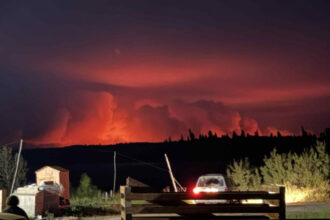In a significant shift in Alberta’s political landscape, former United Conservative Party MLAs are throwing their support behind the resurrection of the Progressive Conservative Party, signaling growing discontent within the province’s governing party. This development comes as the UCP, under Premier Danielle Smith’s leadership, continues to face internal divisions over policy direction and political ideology.
The revival effort, spearheaded by several political veterans who once served under the PC banner, has gained momentum as former UCP legislators express frustration with what they describe as an increasingly rightward shift in provincial governance. Former Calgary-West MLA Mike Ellis, who served in the legislature until 2023, expressed his support for the PC resurrection, stating, “Alberta needs a centrist alternative that balances fiscal responsibility with compassionate social policies—values that defined the Progressive Conservatives during their most successful years.”
The Progressive Conservative Party dominated Alberta politics for an unprecedented 44 consecutive years before merging with the Wildrose Party to form the UCP in 2017. According to political analysts at the University of Calgary, the merger, initially seen as a strategic consolidation of conservative forces, has increasingly been viewed as problematic by moderate conservatives who feel alienated by the UCP’s current direction.
“What we’re witnessing is the natural consequence of forcing two distinct conservative traditions to coexist under one banner,” explains Dr. Melissa Carter, political scientist at CO24 Politics. “The PCs historically represented business-oriented, pragmatic conservatism, while the Wildrose embodied more populist, socially conservative values. These tensions never fully resolved.”
Public opinion data suggests potential support for a revived PC option. A recent poll conducted by Angus Reid indicates that 37% of Albertans who previously voted UCP would consider supporting a more centrist conservative alternative in the next provincial election, expected in 2027.
The financial implications of this political realignment could be substantial for Alberta’s business community, which has traditionally favored stable, predictable governance. Energy sector executives have privately expressed concern that ongoing political volatility could impact investment confidence at a critical time for the province’s economic diversification efforts.
Former PC cabinet minister Diana McQueen has emerged as one of the key figures in the revival movement. “The Progressive Conservative legacy in Alberta was built on balanced budgets, responsible resource development, and forward-looking infrastructure investment,” McQueen noted at a recent Calgary fundraising event. “Many Albertans miss that approach to governance.”
Premier Smith’s office has downplayed the significance of the PC revival effort, with a spokesperson stating that “Albertans decisively rejected division on the right” and emphasizing the government’s focus on “creating jobs, diversifying the economy, and standing up for Alberta’s interests.”
However, political observers across Canada note that the reemergence of the PC brand could significantly alter Alberta’s electoral math. If the revival gains sufficient traction to field candidates in the next election, it could split the conservative vote in key battleground ridings, potentially benefiting the opposition NDP.
As this political drama unfolds against the backdrop of economic uncertainty and federal-provincial tensions, Albertans are left to ponder a profound question: Is the province’s conservative movement stronger united despite its internal contradictions, or would distinct conservative options better serve the diverse political values within Alberta’s right-of-center electorate?










